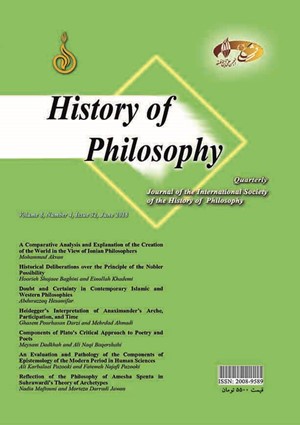-
-
List of Articles
-
Open Access Article
1 - Historical Deliberations over the Principle of the Nobler Possibility
Hoorieh Shojaee Baghini Einollah Khademi -
Open Access Article
2 - A Comparative Analysis and Explanation of the Creation of the World in the View of Ionian Philosophers
Mohammad Akvan -
Open Access Article
3 - Heidegger’s Interpretation of Anaximander’s Arche, Participation, and Time
Ghasem Purhassan Mehrdad Ahmadi -
Open Access Article
4 - Doubt and Certainty in Contemporary Islamic and Western Philosophies
Abdurrazzaq Hesamifar -
Open Access Article
5 - foreword
Hossein Kalbasi Ashtari -
Open Access Article
6 - Components of Plato’s Critical Approach to Poetry and Poets
Meysam Dadkhah Ali Naqi Baqershahi -
Open Access Article
7 - An Evaluation and Pathology of the Components of Epistemology of the Modern Period in Human Sciences
Ali Karbalaei Pazooki Fatemeh Najafi Pazooki -
Open Access Article
8 - Reflection of the Philosophy of Amesha Spenta in Suhrawardi’s Theory of Archetypes
Nadia Maftouni Morteza Darrudi Jawan
-
The rights to this website are owned by the Raimag Press Management System.
Copyright © 2017-2026







